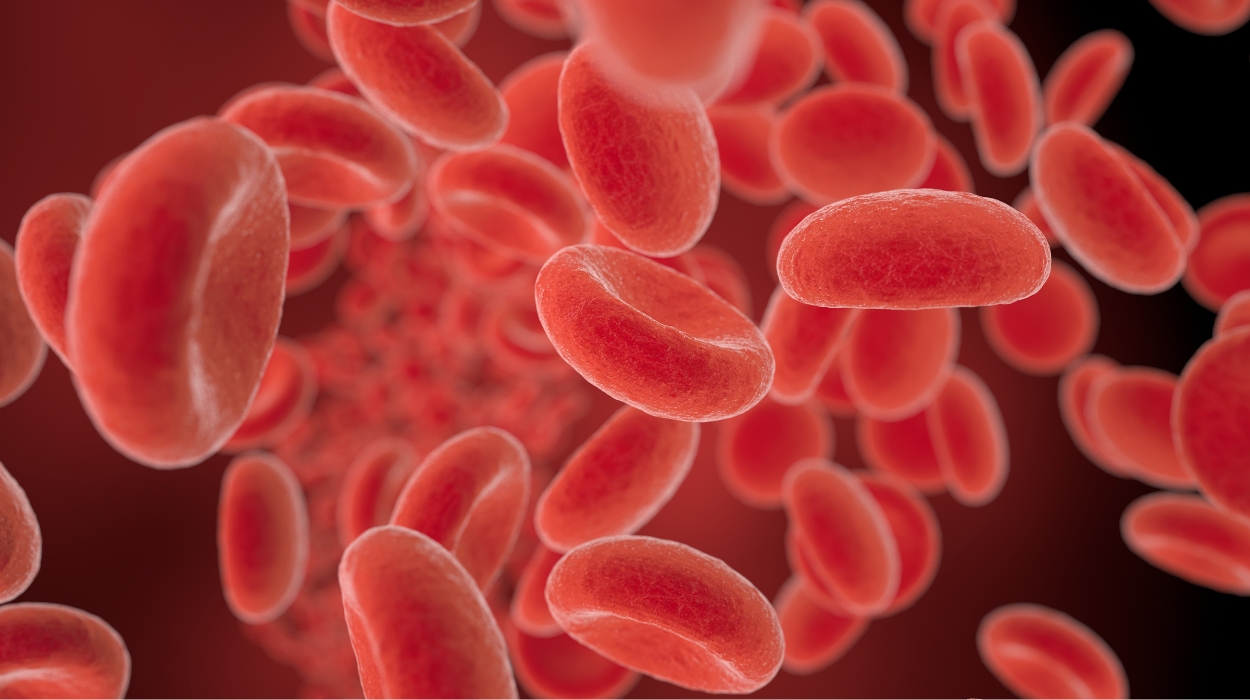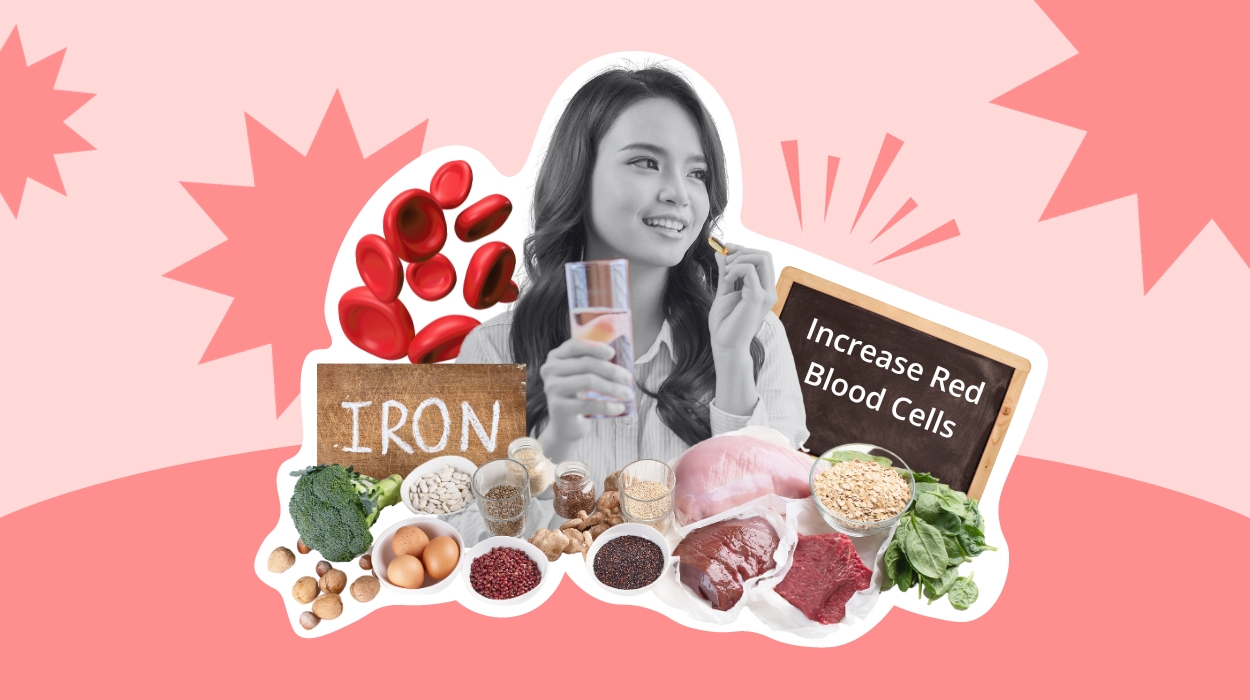We can’t live without red blood cells (RBCs). These little workhorses carry oxygen and carbon dioxide throughout our bodies. Without them, our tissues couldn’t function, and waste would build up. If your red blood cell count gets too low, you’ll develop fatigue, weakness, and other health issues.
This guide will walk you through various strategies for boosting your RBC levels. We’ll also explore how to stimulate your bone marrow to create more healthy red blood cells. These tips will empower you with the knowledge to keep a healthy red blood cell count!
How To Increase Low Red Blood Cell Count?
To quickly increase your red blood cell count:
- Take vitamin supplements, particularly iron, vitamin B12, and folic acid.
- Engage in vigorous exercise regularly.
- Consume iron-rich foods.
- Stay hydrated.
- Get enough sleep.
- Consume less alcohol.
- Avoid smoking.
- Schedule regular health check-ups.
How To Increase Red Blood Cells Quickly
Take Vitamin Supplements

Iron, vitamin B12, and folic acid are crucial for red blood cell production. Supplementing these can boost your body’s production. However, taking too much iron or other vitamins can be dangerous.
Before taking supplements, consult your healthcare provider to ensure the right dosage. The standard dose of iron supplementation[1] is 325mg ferrous sulfate orally 3 times a day. To promote the absorption of iron, pair with 500 units of vitamin C and avoid tea and coffee.
If you experience intolerable side effects of oral supplements, talk to your doctor about iron injections.
Do Vigorous Exercises
You need more red blood cells to meet the increased oxygen demand when you exercise regularly and vigorously. The body responds to this demand by producing more red blood cells, which helps increase the blood’s oxygen-carrying capacity. This improves your physical performance since the body uses oxygen to create energy.
Though exercise is a powerful tool for staying healthy and preventing low BRC count, people with severe anemia should approach exercise with caution until their anemia is corrected. As always, check with your doctor to make sure you’re healthy enough for physical activity.
Eat Iron-Rich Foods
You can get more RBCs by eating foods high in iron[2], such as leafy green veggies and organ meats. Other good sources of iron include legumes, nuts, and fortified cereals. Iron supplements can also be taken to increase your intake. Eating foods high in vitamin C can help your iron metabolism.
Strict vegetarian diets make it difficult to meet all iron and vitamin B12 needs. Such diets often require supplementation.
Stay Hydrated
Good hydration is essential for a healthy red blood cell count. This helps ensure the body has enough oxygen and nutrients to function properly. It also helps to regulate body temperature and to flush out toxins from the body.
Get Enough Sleep
Quality sleep is vital for various bodily functions, including red blood cell production. Ensuring you get enough rest can help keep a normal RBC count.
Aim for at least seven to nine hours of sleep per night. Additionally, regular exercise, a healthy diet, and reduced stress levels can help promote better sleep.
Cut Back On Alcohol
Excessive alcohol consumption[3] can interfere with your body’s ability to produce red blood cells. Consuming large amounts of alcohol can lead to anemia, which can cause fatigue and weakness.
If you drink alcohol, drink small amounts and always with meals. This helps to slow down the absorption of alcohol into the bloodstream. Moderation is key.
Avoid Smoking
Smoking can harm your red blood cells[4] and reduce their ability to carry oxygen effectively. Avoid tobacco products to maintain a healthier RBC count.
Regular Check-Ups
By getting regular checkups, you can detect any underlying conditions and take prompt action. Early diagnosis can help prevent further complications. Additionally, it can help you stay on top of any nutritional deficiencies and make lifestyle changes.
Each of these steps can greatly affect your body’s red blood cell count. By implementing these changes, you can help keep your RBC count healthy.
What Causes A Low Red Blood Cell Count?
You can manage your low red blood cell count by understanding what causes it. RBC counts can drop for several reasons, including nutritional deficiencies, chronic diseases, lifestyle factors, and certain reproductive conditions.
Anemia is strictly defined as a decrease in red blood cell mass[5]. Like a fever, anemia is simply a symptom of something bigger going on. There are three main causes of anemia:
- Blood loss.
- Increased destruction of red blood cells (hemolysis).
- And decreased red blood cell production.
This section further investigates the factors that contribute to these causes.
Nutritional Deficiencies
Your red blood cell count can go down if you don’t get enough essential nutrients[6] in your diet. Starvation, strict diets, and generalized malnutrition are all factors that contribute to nutritional deficiencies.
For instance, anemia occurs when you’re not consuming enough iron. This is a common challenge for individuals who don’t eat meat. A lack of iron can prevent your body from producing enough hemoglobin, the protein that carries oxygen in red blood cells. In either case, you end up with fewer and smaller RBCs.
Other essential nutrients our red blood cells need include vitamin C, vitamin E, vitamin B12, and folic acid (or dietary folate equivalents).
Physical Causes
Trauma, burns, frostbite, and artificial heart valves are all examples of physical factors that can contribute to low red blood cells.
Certain drugs or chemicals can also cause anemia. If you’ve been exposed to arsenic, radiation, or chemotherapy drugs, your healthcare provider should check your RBC counts.
Chronic Diseases
A lot of chronic diseases[7] can also lead to low RBC counts. For instance, kidney disease can cause a low red blood cell count because your kidneys produce erythropoietin, a hormone that stimulates the bone marrow to produce red blood cells. If your kidneys aren’t functioning well, they produce less of this hormone, so you’ll have fewer RBCs.
Cancer, liver disease, chronic infections, and certain autoimmune diseases can also negatively affect your bone marrow, reducing the number of healthy blood cells.
Lifestyle Factors
Lifestyle choices can also result in lower red blood cell counts. For example, excessive alcohol consumption can inhibit red blood cell production. Smoking can also damage existing RBCs, making them less good at carrying oxygen.
Lack of exercise can also lead to a low red blood cell count because physical activity stimulates the body to make more RBCs.
Being A Woman Of Reproductive Age
Menstruation, pregnancy, and childbirth can temporarily drop RBC count for women[8]. A woman’s RBC drops due to blood loss or increased blood volume demand.
Additionally, conditions such as endometriosis can cause heavy or prolonged menstrual bleeding, further reducing RBC count. Getting regular checkups and getting the right treatment can help manage these conditions.
Benefits Of Increasing Red Blood Cells

Having a healthy red blood cell count is crucial to good health because red blood cells transport oxygen from the lungs to the rest of the body. They also remove carbon dioxide, a waste product, transporting it back to the lungs.
The benefits of increasing red blood cells include:
- Improved Energy Levels: With more red blood cells, your body can carry more oxygen, increasing energy levels and reducing symptoms like fatigue and weakness.
- Better Physical Performance: A higher RBC count can improve physical performance, as more oxygen can reach your muscles, helping them work longer and harder.
- Improved Cognitive Function: Your brain needs a constant oxygen supply to function optimally. More RBCs mean better oxygen supply and a better working brain.
- Enhanced Immune System: RBCs contribute to a healthy immune response, helping your body fight infections and diseases.
- Better Overall Health: Optimal RBC count is associated with improved health and well-being, contributing to the proper functioning of all organs and systems.
Tips To Prevent Low Red Blood Cell Count
You can prevent a low red blood cell count with a few mindful practices:
Regular Check-Ups
Regular medical check-ups can help monitor your RBC count and identify potential issues early. In addition, timely corrective measures can prevent serious health implications.
Nutrient-Rich Diet
A balanced diet rich in iron, vitamin B12, folic acid, and other essential nutrients can help maintain a healthy RBC count. In addition, including leafy green vegetables, organ meats, legumes, and fortified cereals in your diet can help boost your RBC production.
Lifestyle Changes
Adopting a healthy lifestyle that includes regular exercise, staying hydrated, getting adequate sleep, and avoiding excessive alcohol consumption and smoking can help maintain a healthy RBC count.
Consult A Healthcare Professional
If you’re at risk of a low RBC count due to a medical condition or treatment, you should talk to a healthcare professional. They can provide personalized advice and treatment options to help manage your RBC count.
Conclusion
Red blood cells are critical in transporting oxygen to the body’s cells and removing carbon dioxide. As a result, a healthy red blood cell (RBC) count can significantly enhance your energy levels, physical performance, and cognitive function. Understanding how to increase your number of red blood cells is critical to maintaining good health and overall well-being.
An underlying condition like iron deficiency anemia or kidney disease often causes a low red blood cell count. If you have a chronic illness or a condition affecting your red blood cell count, it’s always wise to consult a healthcare professional for personalized advice. Regular check-ups can also help monitor your red blood cell count and take corrective action when necessary.
From making sure your diet is rich in iron, vitamin B12, and folic acid, to engaging in regular exercise and maintaining a healthy lifestyle, there are several effective ways to boost your RBC count.
As with any health-related goal, consistency is key. Implementing these strategies into your daily routine can help ensure a healthy RBC count and contribute to your overall health and well-being.
Remember, taking care of your red blood cells is taking care of yourself!
Frequently Asked Questions
The body produces millions of red blood cells daily, and it takes about 4 to 6 weeks to fully produce and circulate new red blood cells. However, the time it takes to increase red blood cells can vary depending on the individual.
Iron, Vitamin B12, and folic acid are key nutrients that can help raise red blood cell counts. Vitamin C can also assist as it helps the body absorb iron. B vitamins, such as B6 and B9 (folate), are also important as they assist in the production of red blood cells.
A low red blood cell count, or anemia, isn’t typically life-threatening. Still, it can lead to other health complications if left untreated. For example, severe anemia can cause heart failure. So always consult a healthcare professional if you suspect you have low RBC levels.
Yes, there are medical treatments available to increase red blood cell counts. These can include blood transfusions, medications to stimulate red blood cell production, removal of the spleen, or a bone marrow transplant in severe cases. However, these treatments are typically reserved for severe cases or when underlying conditions cause low RBC counts.
Yes, regular and vigorous exercise can stimulate your bone marrow to produce more red blood cells to meet the increased oxygen demand. However, overdoing it without adequate rest can have the opposite effect, so find a balance that works for your body.
Yes, several conditions can result in a low red blood cell count, including kidney disease, certain types of cancer, bone marrow disorders, certain infections, and chronic diseases. Additionally, nutritional deficiencies, like low levels of iron, vitamin B12, or folic acid, can contribute to a lower red blood cell count.
 Expert's opinion
Expert's opinion
